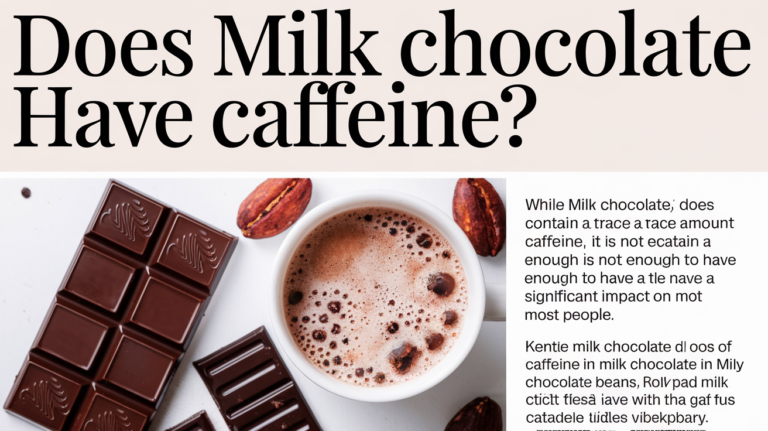Does Milk Chocolate Have Caffeine? : For many of us, chocolate is an irresistible treat, a comforting snack, and an indulgent pick-me-up. But have you ever wondered, “Does milk chocolate have caffeine?” The question often stirs up curiosity among chocolate enthusiasts, health-conscious individuals, and even caffeine lovers. While dark chocolate has long been known to contain caffeine, the role of milk chocolate in your daily caffeine intake may surprise you.
This blog will explore everything you need to know about milk chocolate and caffeine. We’ll uncover its caffeine content, debunk common myths, and share practical tips for enjoying this beloved treat without caffeine concerns. By the end, you’ll be better equipped to answer this sweet question yourself!
Does Milk Chocolate Have Caffeine? The Science Behind It
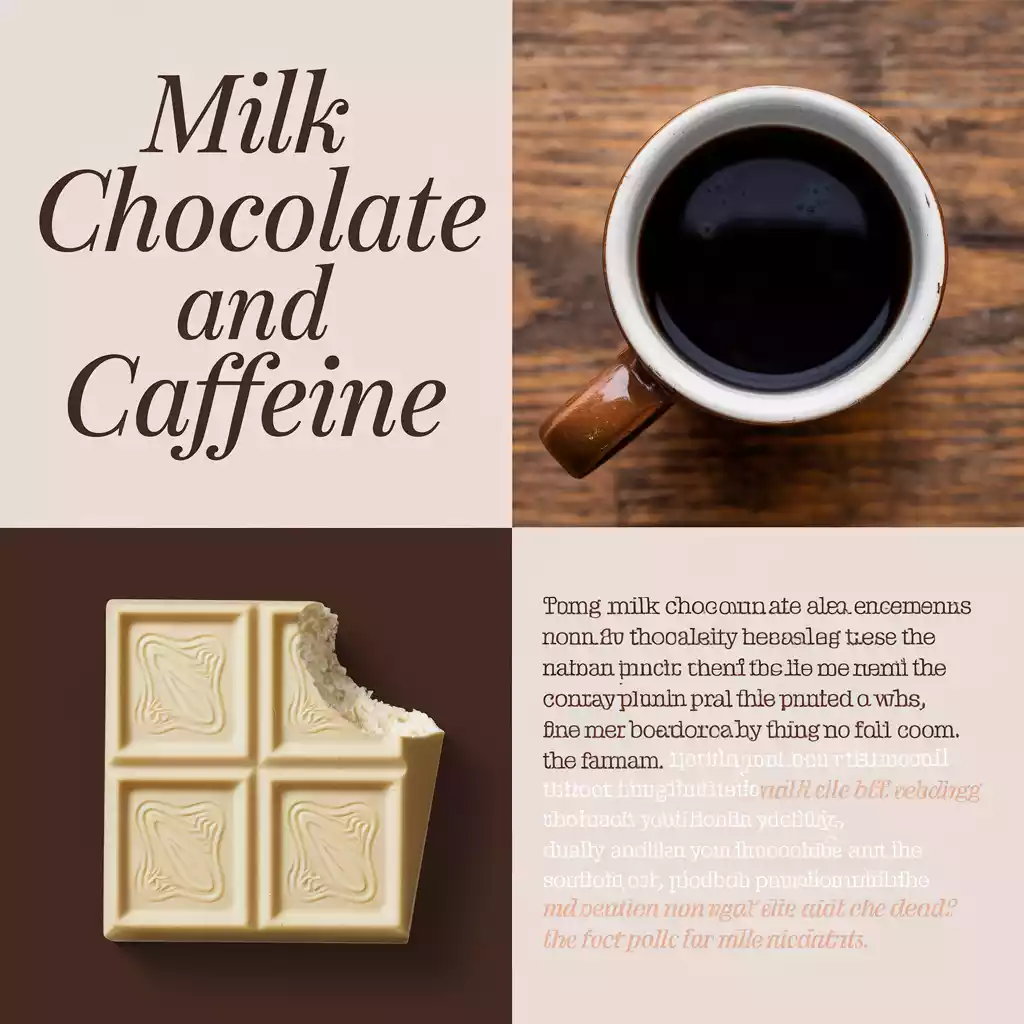
What Makes Chocolate a Source of Caffeine?
Caffeine naturally occurs in cacao beans—the primary ingredient in all types of chocolate. These beans also contain a compound called theobromine, which has similar stimulating effects to caffeine. However, the levels of caffeine and theobromine vary depending on the type of chocolate and how it’s processed.
Since milk chocolate contains less cacao and more milk and sugar compared to dark chocolate, it inherently has lower levels of caffeine. That said, the presence of caffeine in milk chocolate still exists, though in much smaller amounts.
Comparing Caffeine Levels in Different Types of Chocolate
Here’s a quick comparison to give you a clearer picture of how caffeine levels vary across different types of chocolate:
- Dark Chocolate (70% or higher cocoa): This type of chocolate is the richest in caffeine, containing around 12–20 mg of caffeine per ounce. The higher the cocoa percentage, the more caffeine it tends to have, as caffeine is naturally present in cacao solids.
- Milk Chocolate: With approximately 3–5 mg of caffeine per ounce, milk chocolate contains significantly less caffeine due to its lower cocoa content and higher proportion of milk and sugar.
- White Chocolate: Essentially caffeine-free, white chocolate contains no cacao solids, which are the primary source of caffeine. Instead, it is made from cocoa butter, sugar, and milk, giving it its creamy texture and sweet flavor.
For reference, a standard 8-ounce cup of coffee contains roughly 95 mg of caffeine, making even the most caffeine-rich dark chocolate a much milder source by comparison. However, this means that consuming large amounts of dark chocolate could still contribute noticeably to your daily caffeine intake. Knowing these caffeine differences can help you make informed choices, whether you’re looking for a small boost or trying to avoid caffeine altogether.
Does Milk Chocolate Have Caffeine? Facts You Should Know
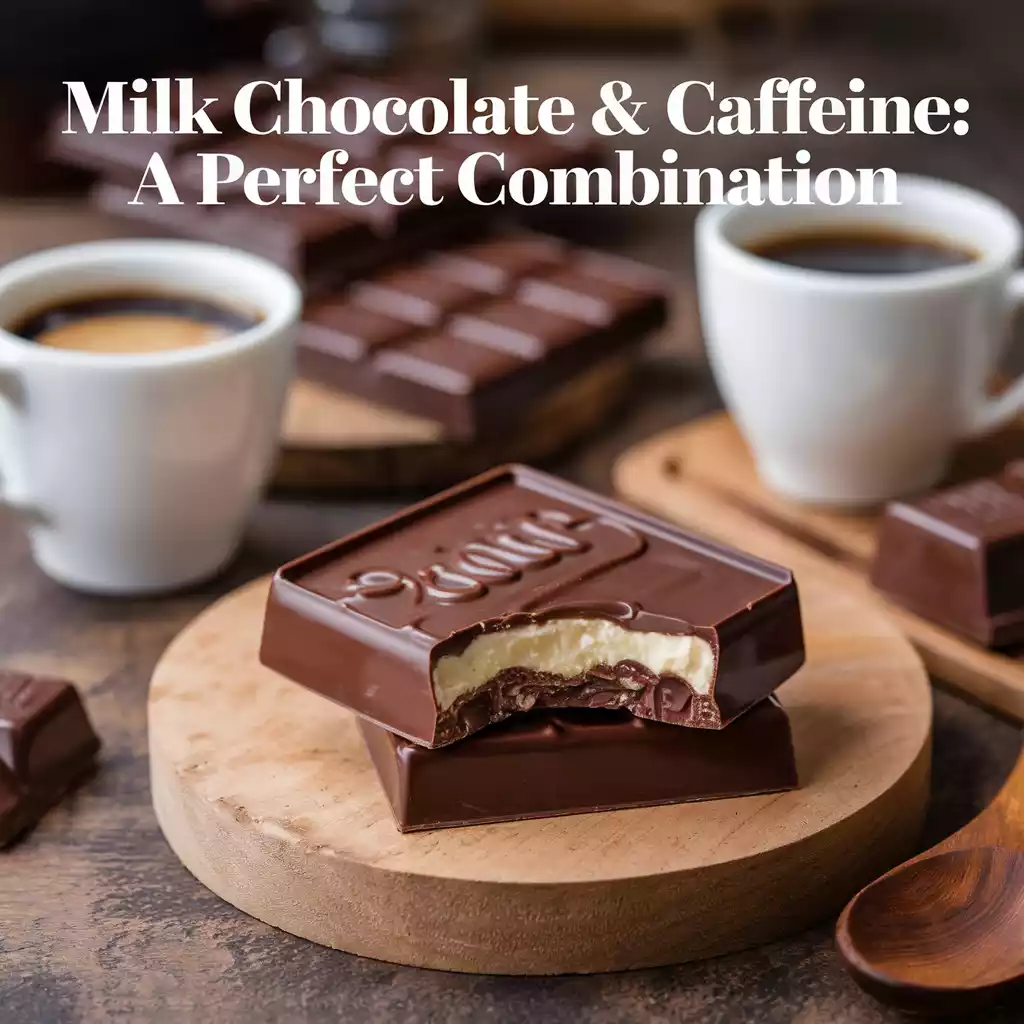
How Much Caffeine Is in a Standard Milk Chocolate Bar?
A standard bar of milk chocolate, which typically weighs about 1.55 ounces, contains approximately 10 mg of caffeine. While this amount is relatively small and unlikely to cause jitters for most people, it’s worth noting that it does contribute to your overall daily caffeine intake. If you’re enjoying other caffeinated foods or drinks—such as coffee, tea, or energy drinks—this small amount can add up over time. Additionally, dark chocolate tends to contain more caffeine than milk chocolate due to its higher cocoa content, so it’s something to keep in mind if you’re a chocolate lover trying to manage your caffeine consumption.
Does Eating Milk Chocolate Affect Your Sleep?
While milk chocolate’s caffeine levels are relatively low compared to other sources like coffee or dark chocolate, its impact on sleep can vary depending on how much you consume and your personal sensitivity to caffeine. For some, even the small amounts of caffeine found in milk chocolate might be enough to disrupt their ability to fall asleep or stay asleep, especially if consumed close to bedtime.
Additionally, the sugar content in milk chocolate can cause a mild energy boost, which might make it even harder to wind down for the night. If you’re someone who is particularly sensitive to caffeine or sugar, it may be best to avoid milk chocolate as a late-night snack and opt for something that won’t interfere with your sleep cycle. Remember, small dietary changes can often make a big difference in improving your overall sleep quality.
Does Milk Chocolate Have Caffeine? Busting Myths
Why Some Believe Milk Chocolate Has No Caffeine
The myth that milk chocolate contains no caffeine might come from its sweet and creamy flavor, which contrasts with the bitterness typically linked to caffeinated products like coffee or dark chocolate. This misconception is understandable, as milk chocolate’s mild taste can make it seem less potent. However, the truth lies in the cacao—the essential ingredient in all “true” chocolate. Cacao naturally contains caffeine, and this remains true regardless of how much sugar or milk is added to the recipe. Even though milk chocolate has less cacao and therefore less caffeine compared to dark chocolate, it still contains a small amount, enough to provide a mild energy boost for those who consume it.
Is Milk Chocolate a Safe Option for Kids?
Milk chocolate is generally considered safe for children due to its low caffeine content, making it a popular treat for kids. However, it’s important to remember that caffeine is a stimulant that can have noticeable effects, even in small amounts, such as increased alertness or restlessness. While the caffeine in milk chocolate is minimal compared to coffee or energy drinks, it’s still a good idea to monitor your child’s overall intake. Pay attention to other sources of caffeine they might be consuming, such as soda, tea, or even certain flavored snacks, as the combined amount can add up. Moderation is key to ensuring your child enjoys chocolate without any unwanted side effects.
Does Milk Chocolate Have Caffeine? The Health Perspective

Caffeine in Milk Chocolate and Its Impact on Your Body
Milk chocolate’s low caffeine levels are unlikely to significantly impact most people. However, it’s worth noting that caffeine affects everyone differently. For some, it may contribute to increased alertness and improved focus, while for others, it may lead to slight restlessness, especially in combination with other sources of caffeine.
Additionally, milk chocolate often contains added sugar and fat, which may outweigh the negligible effects of its caffeine content when considering overall health.
Can Milk Chocolate Provide a Caffeine Boost?
If you’re looking for a quick pick-me-up, milk chocolate isn’t your best bet. With around 10 mg of caffeine per standard bar, its effect on alertness is minimal compared to a cup of coffee. If you’re caffeine-sensitive, though, this might work as a gentler alternative for a mild energy boost.
Does Milk Chocolate Have Caffeine? Everyday Consumption Tips
How Much Milk Chocolate Is Too Much?
Enjoy milk chocolate in moderation to satisfy your sweet tooth while keeping your diet balanced. While its caffeine content is relatively low compared to dark chocolate or coffee, milk chocolate is often high in sugar and calories, which can add up quickly if you overindulge. To avoid this, stick to a small portion—a few squares or one mini bar. This allows you to enjoy the rich, creamy sweetness without negatively impacting your health goals. Pair it with a healthy snack, like a handful of nuts or fresh fruit, to make it even more satisfying while keeping your indulgence in check.
Best Times to Enjoy Milk Chocolate Without Caffeine Worries
To avoid disrupting your sleep, it’s best to enjoy milk chocolate earlier in the day. Its subtle caffeine content can keep you awake if consumed too late, but it makes for a delightful mid-morning or post-lunch treat when you need a pick-me-up. Pair it with a cup of coffee for an indulgent double-caffeine combo (if your tolerance allows!) to power through your day with an extra boost of energy. Alternatively, for a more calming snack, pair your milk chocolate with a glass of milk to help balance out the sugar and caffeine. This combination not only tastes delicious but also provides a comforting break in your busy schedule.
Does Milk Chocolate Have Caffeine? A Sweet Discovery
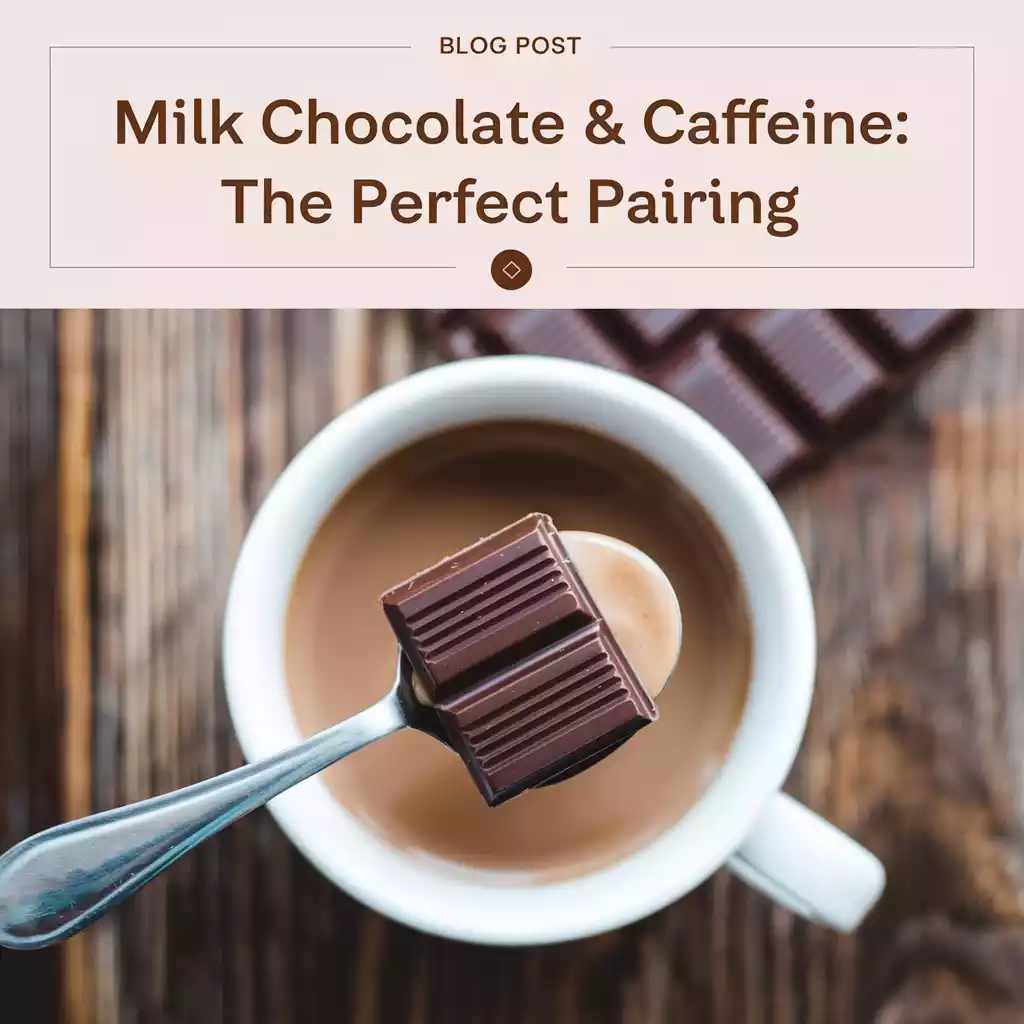
Exploring Hidden Sources of Caffeine in Your Diet
Caffeine isn’t just hiding in your coffee cup—it can sneak into your diet in unexpected ways. Milk chocolate, for example, contains small amounts of caffeine, but it’s far from the only subtle source. You might also be consuming caffeine through:
- Certain sodas (e.g., cola) that often have a caffeine content similar to a weak cup of tea.
- Energy drinks, which not only pack a caffeine punch but may also contain other stimulants that amplify its effects.
- Some brands of tea, including green and black teas, as well as flavored water, which can have varying levels of caffeine depending on the brand and preparation.
Being mindful of these hidden sources can help you manage your overall caffeine intake and avoid issues like jitteriness, headaches, or disrupted sleep. Taking a closer look at labels and knowing what’s in your food and drinks is key to staying in control.
Why You Shouldn’t Overlook Milk Chocolate in Your Caffeine Count
It’s easy to dismiss milk chocolate as a significant source of caffeine, especially when compared to coffee or energy drinks. However, if you’re consuming multiple bars or pairing it with other caffeinated treats like cola, tea, or dark chocolate, the numbers can quickly add up. Even small amounts of caffeine from different sources can contribute to your daily intake, which might be higher than you realize. Tracking your overall caffeine consumption—not just from coffee—is essential for maintaining a balanced diet and avoiding unwanted side effects, such as restlessness, jitters, or trouble sleeping. Awareness of hidden caffeine sources can help you make more informed dietary choices and keep your energy levels steady throughout the day.
A Sweet Balance Awaits
The short answer to “Does milk chocolate have caffeine?” is yes—but in very small amounts. While it won’t replace your morning coffee or significantly disrupt your sleep (in most cases), it’s still a good idea to be mindful of how it contributes to your overall caffeine levels. Whether you’re a chocolate connoisseur, a health enthusiast, or simply curious, understanding milk chocolate’s caffeine content allows you to indulge responsibly.
And remember, moderation is the key to enjoying any treat. Savor your favorite milk chocolate bar, and delight in the sweetness it brings—without worrying about the small dose of caffeine it contains.
5 FAQs about Milk Chocolate and Caffeine
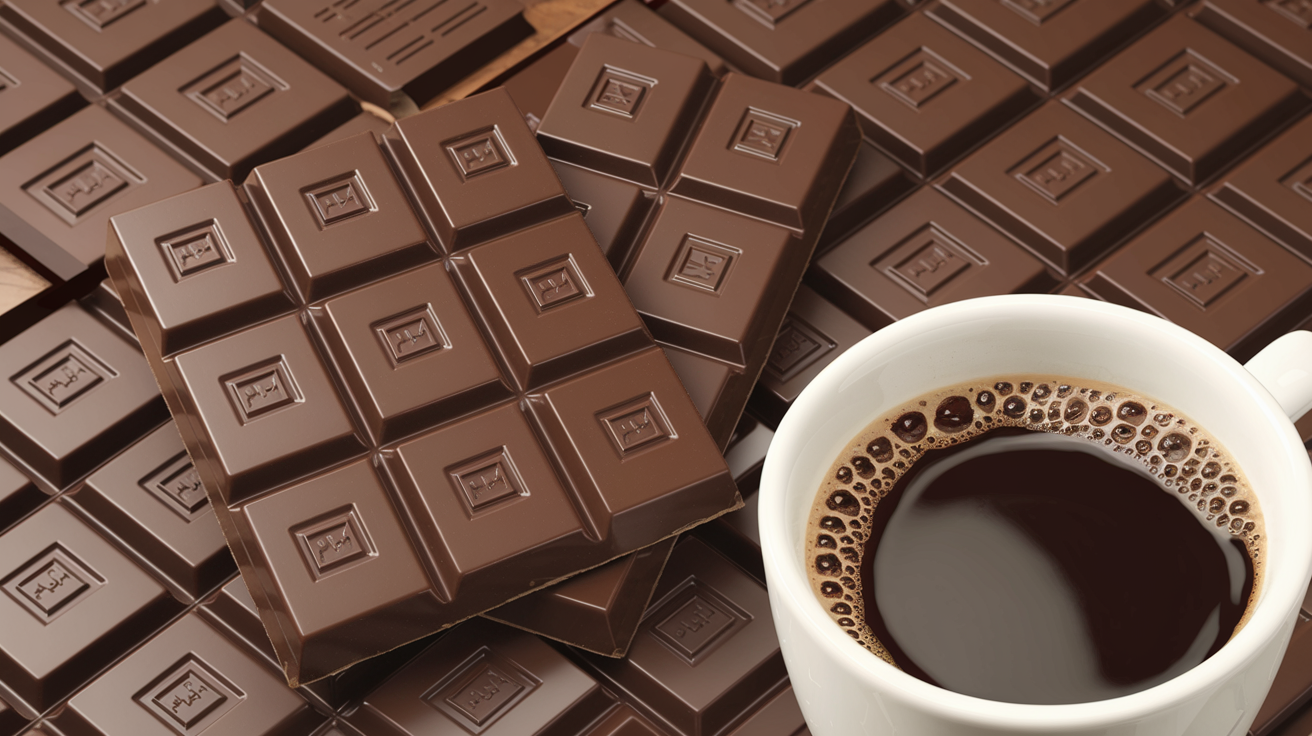
- How much caffeine does milk chocolate contain?
- While milk chocolate does contain caffeine, the amount is relatively small compared to other sources like coffee or black tea. On average, milk chocolate contains around 1-15 milligrams of caffeine per ounce, depending on the brand and cocoa content.
- Can milk chocolate keep you awake at night?
- In most cases, the amount of caffeine in milk chocolate is unlikely to disturb your sleep. However, individuals who are more sensitive to caffeine may still experience mild effects. It’s always a good idea to be mindful of your own caffeine sensitivity and consumption, especially if you tend to be more sensitive to stimulants.
- Is there a noticeable difference in caffeine content between dark chocolate and milk chocolate?
- Yes, dark chocolate generally contains more caffeine than milk chocolate. The higher cocoa content in dark chocolate contributes to a slightly higher caffeine content compared to milk chocolate. However, the difference is still relatively small, and both types of chocolate are considered to have relatively low levels of caffeine.
- Is it safe to consume milk chocolate if I am sensitive to caffeine?
- As mentioned earlier, the caffeine content in milk chocolate is generally low and unlikely to cause significant issues for individuals who are sensitive to caffeine. However, it’s always best to listen to your body and make choices that align with your personal tolerance and health needs.
- Are there any health benefits associated with consuming milk chocolate?
- While milk chocolate does contain some beneficial compounds, such as antioxidants and minerals like calcium, it’s important to consume it in moderation as part of a balanced diet. Dark chocolate with higher cocoa content is generally considered to offer more potential health benefits due to its higher concentration of cocoa solids.
Remember to enjoy your milk chocolate treats in moderation and be mindful of your overall caffeine intake for maintaining a balanced and enjoyable snacking experience!
Does Milk Chocolate Have Caffeine? Happy snacking, chocolate lovers!
Post Disclaimer
The information contained in this post is for general information purposes only. The information is provided by Feast Forge Chef and while we endeavour to keep the information up to date and correct, we make no representations or warranties of any kind, express or implied, about the completeness, accuracy, reliability, suitability or availability with respect to the website or the information, products, services, or related graphics contained on the post for any purpose.

